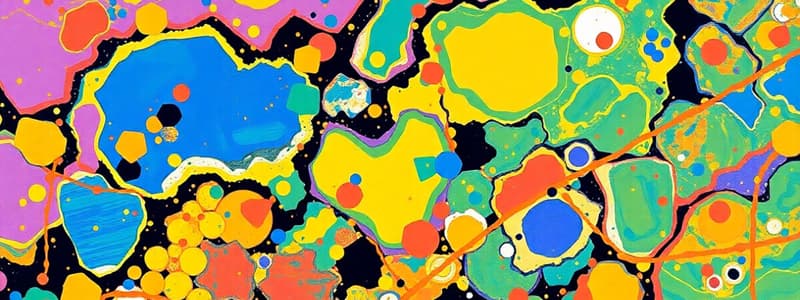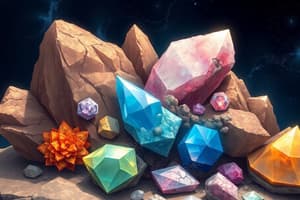Podcast
Questions and Answers
Which of the following minerals is not considered a rock-forming mineral?
Which of the following minerals is not considered a rock-forming mineral?
- Mica
- Garnet (correct)
- Quartz
- Feldspar
What term describes crystals that exhibit well-developed faces?
What term describes crystals that exhibit well-developed faces?
- Granular
- Acicular
- Foliated
- Euhedral (correct)
Which mineral shape is best described as 'blade-like, slender and flattened'?
Which mineral shape is best described as 'blade-like, slender and flattened'?
- Bladed (correct)
- Columnar
- Foliated
- Platy
What does the term 'cleavage' indicate in terms of mineral properties?
What does the term 'cleavage' indicate in terms of mineral properties?
Which of the following descriptions refers to a 'grape-like' mass of mineral?
Which of the following descriptions refers to a 'grape-like' mass of mineral?
Which characteristic of a mineral refers to its resistance to scratching?
Which characteristic of a mineral refers to its resistance to scratching?
What term describes a mineral that is flat and tablet-shaped?
What term describes a mineral that is flat and tablet-shaped?
Which of the following crystal habits describes mineral prisms that are extremely slender?
Which of the following crystal habits describes mineral prisms that are extremely slender?
What is one of the key contributions of Norman Levi Bowen to geology?
What is one of the key contributions of Norman Levi Bowen to geology?
Which mineral crystallizes first in the temperature range of 1200° to 1300°C?
Which mineral crystallizes first in the temperature range of 1200° to 1300°C?
What is the most characteristic but least diagnostic property of minerals?
What is the most characteristic but least diagnostic property of minerals?
Which of the following elements makes up a significant portion of the Earth's crust?
Which of the following elements makes up a significant portion of the Earth's crust?
Which of the following best describes a mineral?
Which of the following best describes a mineral?
Which mineral group does Biotite belong to?
Which mineral group does Biotite belong to?
What characteristic feature does Quartz exhibit?
What characteristic feature does Quartz exhibit?
Which variety of Muscovite is characterized by a manganese-rich composition?
Which variety of Muscovite is characterized by a manganese-rich composition?
How does Muscovite primarily function in industrial applications?
How does Muscovite primarily function in industrial applications?
Which mineral is isomorphous with both Diopside and Hedenbergite?
Which mineral is isomorphous with both Diopside and Hedenbergite?
What is the primary characteristic of the mineral group known as Feldspar?
What is the primary characteristic of the mineral group known as Feldspar?
Which variety of Muscovite is recognized for its light pink color?
Which variety of Muscovite is recognized for its light pink color?
Which of the following minerals is commonly used in semiconductors?
Which of the following minerals is commonly used in semiconductors?
Which statement best describes the chemical composition of quartz?
Which statement best describes the chemical composition of quartz?
What is the hardness of quartz on the Mohs scale?
What is the hardness of quartz on the Mohs scale?
Which term describes the lustre of quartz?
Which term describes the lustre of quartz?
What is the typical streak color of quartz when rubbed against porcelain?
What is the typical streak color of quartz when rubbed against porcelain?
Which property describes the way quartz breaks when fractured?
Which property describes the way quartz breaks when fractured?
What type of rock can quartz be found in?
What type of rock can quartz be found in?
What is a notable physical property of certain quartz specimens?
What is a notable physical property of certain quartz specimens?
What does piezoelectric mean in relation to quartz?
What does piezoelectric mean in relation to quartz?
Flashcards are hidden until you start studying
Study Notes
Accessory Minerals
- Accessory minerals occur in small quantities within a rock.
- These minerals include Zircon, Monazite, Apatite, Titanite, Tourmaline, Pyrite, and opaques.
Bowen Reaction Series
- Norman Levi Bowen was a Canadian geologist who studied the cooling of magmas.
- He created the Bowen Reaction Series which describes the order in which minerals crystallize from cooling magma.
- Olivine crystallizes first between 1200° and 1300°C.
Essential Elements in Earth's Crust
- Eight elements make up 98% of the Earth's crust.
- These elements are: Oxygen, Silicon, Aluminum, Iron, Magnesium, Calcium, Sodium, and Potassium.
Physical Properties of Minerals
- Color: One of the most obvious characteristics of a mineral.
- Crystal Habit: Refers to the characteristic shape of a mineral unit, like euhedral crystals with well-developed faces, or aggregates of crystals, such as acicular (needle-like) or granular.
- Streak: The color of the mark left behind on unglazed porcelain when a mineral is rubbed against it.
- Hardness: A measure of a mineral's resistance to scratching.
- Cleavage: An indication of how well a mineral breaks along planes of weakness.
- Luster: The way a mineral surface reflects light. Types include adamantine, dull, greasy, pearly, vitreous, silky, resinous, and metallic.
- Transparency: The ability of light to pass through a mineral.
Quartz
- Chemical Formula: SiO2 (Silicon Dioxide)
- Color: Varies widely, including colorless, white, purple, pink, brown, black, gray, green, orange, yellow, blue, and red.
- Streak: White.
- Hardness: 7.
- Crystal System: Hexagonal.
- Cleavage: Indiscernible.
- Fracture: Conchoidal (curved, shell-like fracture).
- Other ID Marks:
- Some specimens fluoresce, especially white and green.
- Triboluminescent (emits light when scratched).
- Piezoelectric (generates an electric charge under pressure).
- Dissolves in: Hydrofluoric acid.
- Group: Silicates; Tectosilicates; Silica Group.
Biotite
- A very common form of mica.
- Named after Jean Baptiste Biot, a French physicist.
Muscovite
- The most common mineral in the mica family.
- A poor conductor of heat and electricity, used as an insulator in various products.
- It occurs in several varieties:
- Alurgite: Manganese-rich, pink to red.
- Fuchsite: Dark green, chromium-rich.
- Mariposite: Green, chromium-rich, found in Mariposa.
- Schernickite: Light pink.
- Sericite: Fine-grained, somewhat silky.
- Star Muscovite: Twinned Muscovite crystals in star-shaped sections.
Feldspar
- A large group of rock-forming silicate minerals, comprising over 50% of the Earth's crust.
Augite
- Isomorphous with Diopside and Hedenbergite.
- Varieties:
- Fassaite: Low iron content, lighter green color, more translucent.
- Jeffersonite: Has a higher iron content, usually darker green.
Studying That Suits You
Use AI to generate personalized quizzes and flashcards to suit your learning preferences.




